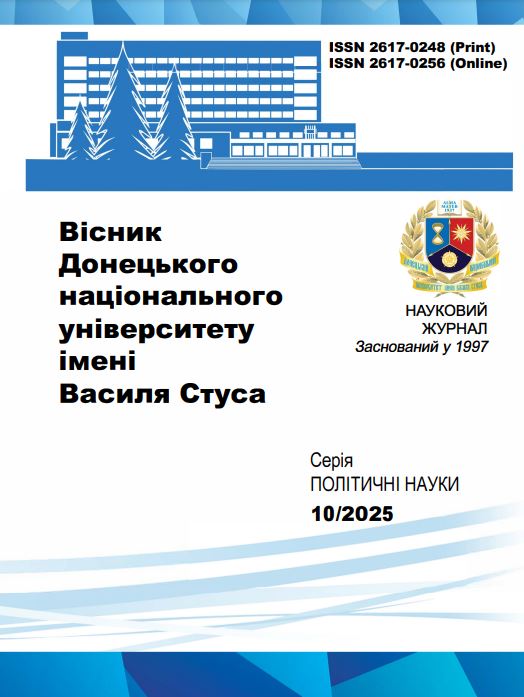New institutions: determinants of emergence and subjectivity in politics
DOI:
https://doi.org/10.31558/2617-0248.2025.10.4Keywords:
organizations, political actors, political processes, Republic of Poland, Russian-Ukrainian war, institutе, institutionAbstract
Based on the neo-institutionalist concept, the essence of the terms "institute" and "institution" is analyzed. The theoretical and methodological approaches to the emergence of new political institutions are substantiated. The influence of endogenous factors on the institutional environment as a determinant of the emergence of consolidating institutions is clarified. The Council for Cooperation with Ukraine as an auxiliary body under the Prime Minister of the Republic of Poland is chosen as an example, which fully meets the characteristics of an institution: it is a legitimate body with a consultative advisory status and a clear organizational structure. Institutions provide legal underpinning for the rules and procedures generated by specific organizations. In this case, the Council for Cooperation with Ukraine is grounded in a complex of complementary interconnected institutions, including the state, the military, the economy, national security, and international security. Under the influence of the Russo-Ukrainian war, these institutions are undergoing significant politicization, which shapes the nature of interstate relations, alters the behavior of political actors, and leads to the adjustment of rules, norms, statuses, and roles based on the development of consolidated approaches to security issues and assistance to Ukraine in countering aggression and rebuilding the economy. The establishment of the institute contributed to "relieving" other Polish state decision-making centers, ensuring closer coordination with Ukrainian state institutions and leaders, civil society actors, local self-government bodies, and think tanks. Overall, this influenced the increased awareness of decision-making centers, the definition of clearer "rules of the game" between the states, more predictable behavior of political actors, and a reduction in the level of conflict in interstate relations.
References
Кармазіна М., Шурбована О. «Інститут» та «інституція»: проблема розрізнення понять. Політичний менеджмент. 2006. № 4. С. 10–19.
Макалюк І., Жалдак Г., Мартиненко В. «Інституція» та «інститут»: тенденція «штучної підміни» понять. Agricultural and Resource Economics. 2022. Vol. 8. No. 1. pp. 204–234. URL: https://doi.org/10.51599/are.2022.08.01.11.
Бергер П. Що таке інституція? Випадок мови. / пер. Ю. Яремко. URL: http://www.ji.lviv.ua/n35texts/berger.htm
North D. Institutions, Institutional Change and Economic Performance. Cambridge–New York: Cambridge University Press. 1990. 152 р.
Mazur S. Zmiana instytucjonalna. Zarządzanie Publiczne. 2013. Nr 2–3. P. 34-43.
Szacki J. Historia myśli socjologicznej. Warszawa: Wydawnictwo Naukowe PWN. 2002. 1075 s.
Великий тлумачний словник сучасної української мови / укл. і голов. ред. В. Т. Бусел. Київ, Ірпінь: ВТФ «Перун», 2005. 1728 с
Zarządzenie nr 41 Prezesa Rady Ministrów z dnia 5 kwietnia 2024 r. w sprawie Rady do spraw Współpracy z Ukrainą. gov.pl. Serwis Rzeczypospolitej Polskiej. URL: https://www.gov.pl/web/premier/rada-do-spraw-wspolpracy-z-ukraina2 .
У Польщі створять Раду з питань співпраці з Україною. Радіо свобода. 13 квітня 2024. URL: https://www.radiosvoboda.org/a/news-polshcha-rada-spivpratsya-ukrayina/32903240.html.

